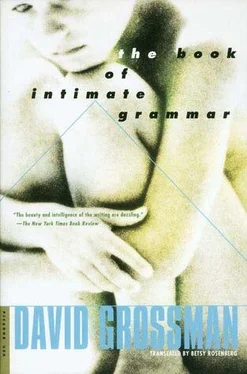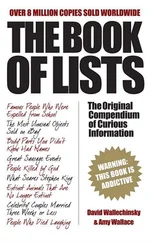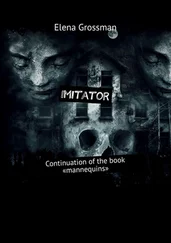David Grossman - The Book of Intimate Grammar
Здесь есть возможность читать онлайн «David Grossman - The Book of Intimate Grammar» весь текст электронной книги совершенно бесплатно (целиком полную версию без сокращений). В некоторых случаях можно слушать аудио, скачать через торрент в формате fb2 и присутствует краткое содержание. Год выпуска: 2002, ISBN: 2002, Издательство: Picador, Жанр: Современная проза, на английском языке. Описание произведения, (предисловие) а так же отзывы посетителей доступны на портале библиотеки ЛибКат.
- Название:The Book of Intimate Grammar
- Автор:
- Издательство:Picador
- Жанр:
- Год:2002
- ISBN:9781466803749
- Рейтинг книги:3 / 5. Голосов: 1
-
Избранное:Добавить в избранное
- Отзывы:
-
Ваша оценка:
- 60
- 1
- 2
- 3
- 4
- 5
The Book of Intimate Grammar: краткое содержание, описание и аннотация
Предлагаем к чтению аннотацию, описание, краткое содержание или предисловие (зависит от того, что написал сам автор книги «The Book of Intimate Grammar»). Если вы не нашли необходимую информацию о книге — напишите в комментариях, мы постараемся отыскать её.
The Book of Intimate Grammar — читать онлайн бесплатно полную книгу (весь текст) целиком
Ниже представлен текст книги, разбитый по страницам. Система сохранения места последней прочитанной страницы, позволяет с удобством читать онлайн бесплатно книгу «The Book of Intimate Grammar», без необходимости каждый раз заново искать на чём Вы остановились. Поставьте закладку, и сможете в любой момент перейти на страницу, на которой закончили чтение.
Интервал:
Закладка:
At six-thirty that evening Mama cried “Enough!” and her voice was hoarse from the dust and the silent curses, as if she had spent the whole time screaming the same word over and over. Papa heard. His red neck, gleaming with drops of sweat, contracted. He swung a few times more. For a moment he seemed about to rebel, as though he didn’t want to stop yet. She moved her lips to speak, but no sound came out. Papa slowed to a halt. And dropped the hammer. He reassumed his erstwhile shape, spreading out and thickening. As he swept up the rubble and the dust and the chunks of plaster, Edna waved limply and said, Never mind now. Go. Tomorrow at the same time. Papa glanced back at her. He was bewildered. He had not turned his head in the past hour, or seen the transformation taking place. His own face was also transformed now, though Aron couldn’t say how.
That’s just the way Moshe looked, fixing up the house for me when we were newlyweds.
“The ladder I’ll leave here,” he said.
“Yes, do,” whispered Edna.
“Tomorrow I’ll come again,” he said.
“I’ll look after it for you,” she murmured.
“How about that rain?” he asked too loudly, hurrying to the window, massaging his right arm.
But the heavy clouds were moping over their interrupted journey. Far away, beyond the rocky hills, winter was closing in, galloping its chariots; a grim commander hurrying to a remote province where cries of mutiny had been heard. And the startled procession emerged through the door of Edna Bloom’s into the cold of the evening, with Mama in the lead, followed by Yochi, and then Aron, and Papa bringing up the rear, head bowed, like a bull led back to his pen for the night.
17
 Supper was lapped in unbearable silence. Papa chewed and swallowed and asked for more, the work must have whet his appetite, and Mama dished his food out carefully, as though feeding the flames of an insatiable fire. Woodenly she watched him lean over his plate, his forehead glowing red in a rising crescendo of sucking and gasping and gulping. After supper Aron took the garbage out, but as soon as Mama handed him the pail, he knew; he knew by her face and her sideways glance. Near the rusty barrel of heating oil behind the building, Aron crouched down and stuck his hand in. He groped around in the muck until he found it: a stiff package tied with string. He took it out and unwrapped it: inside he found an old pair of high heels, but there was no whiff of champagne. When he finished dumping the garbage, he took the shoes down to the furnace room and hid them in his lair, together with the flowered dress, the striped bathing suit, and the shorn braid, now full of mildew.
Supper was lapped in unbearable silence. Papa chewed and swallowed and asked for more, the work must have whet his appetite, and Mama dished his food out carefully, as though feeding the flames of an insatiable fire. Woodenly she watched him lean over his plate, his forehead glowing red in a rising crescendo of sucking and gasping and gulping. After supper Aron took the garbage out, but as soon as Mama handed him the pail, he knew; he knew by her face and her sideways glance. Near the rusty barrel of heating oil behind the building, Aron crouched down and stuck his hand in. He groped around in the muck until he found it: a stiff package tied with string. He took it out and unwrapped it: inside he found an old pair of high heels, but there was no whiff of champagne. When he finished dumping the garbage, he took the shoes down to the furnace room and hid them in his lair, together with the flowered dress, the striped bathing suit, and the shorn braid, now full of mildew.
A year had passed since Mama and Papa put Grandma in the hospital, after the scenes she made at his bar mitzvah. Again she had fought like an animal, spitting and scratching and cursing at them, though without words this time, she could only cry and snort, so it was easy for Mama to help Papa load her into the ambulance. And later, at home, Mama put on her brown-check dress and packed some sandwiches and jars of sour cream and a bottle of tomato juice and a few squares of Grandma’s favorite chocolate, wrapped in wax paper and nylon, with a labelon every sandwich and a rubber band, and she put it all in her bag and set off for the hospital accompanied by Aron and Yochi.
They found Grandma Lilly lying in the ward, after her sedative. She quietly gazed at the visitors but didn’t seem to recognize them. It’s me, Aron, he whispered with a chill of dismay. See, Grandma, it’s me, but she didn’t remember him. Mama, who was ready to cry, with a hanky in her hand, rose swiftly to the occasion and went to work, wiping the goo from Grandma’s eyes, arranging her pillows, massaging the soles of her swollen feet. She handled her without disgust, moving over her like a nimble spider. A pockmarked nurse with a scowling face brought supper in. She was about to feed Grandma when Mama grabbed the tray from her with a benevolent smile, rinsed Grandma’s dentures in the sink, stuck them carefully back in her mouth, jiggled her jaws till they were firmly in place, propped her up, tilted her head back, and started patiently spooning yogurt into her.
Every day they went to visit her. Sometimes Aron ate lunch at home by himself, and then hurried to the hospital. Mama and Papa would already be there, next to Grandma’s bed, and usually Yochi too. Grandma lay in her bed, lost and tiny, barely moving. Maybe she didn’t notice the commotion around her, all the effort his parents had put into giving her a haimish feeling. She had a little cupboard by the bed, which Mama arranged for her as only she knew how: Grandma’s bathrobe, her soap dish, a glass for her dentures, a pillowcase from home, an embroidered serviette, her favorite comb, the elastic bandages for her swollen feet, a tube of hand cream, a jar of special face lotion, and a hot-water bottle — she had everything she needed, it was beautiful to see. With tender devotion his parents watched over her, Yochi and Aron at their side, quietly discussing the concerns of the day or the news of the world: about the Kaminers’ youngest daughter who landed herself a fiancé, but they’re keeping it a secret that her father is sick, because kidneys are hereditary, or about the latest invention, Papa told them, designed to help people like him fill in the Toto automatically, it guesses where to put the X’s all by itself, and mark my words, a hundred years from now everything will be automatic, they won’t need people anymore, everyone will be replaced by robots, there’ll be robots, robots everywhere, and Mama told them about the new counter at the supermarket, with delicacies like fish roe and lox and moldy green cheese at seventeen pounds for two hundred grams, horrid-looking stuff, but still,there’s a feeling of culture, a modern, European atmosphere. Every now and then she would get up to rearrange Grandma’s pillow, to change her position or wipe her nose. She performed her duties with lofty dedication, refusing to entrust her to anyone else, and there were already arguments at the hospital, with the nurses and with Yochi too, till Mama finally relented and gave Yochi the task of combing Grandma’s hair, and Yochi fought like a lion to stop Mama from cutting it when it started growing long, and Papa’s task, besides his calming influence, was to pick Grandma up so Mama could smooth the sheets or put the bedpan under her, and even though he was very strong, his face would turn a bright red. Mamchu’s getting heavy, he blurted, she looks like a bird, but she weighs a ton, and Aron, whose special task was to make sure Grandma’s little toe, the rebel, didn’t start sneaking up on its neighbor, reflected that maybe she was heavy because there wasn’t enough life left in her, it’s life that gives lightness, and a moment later the sneaky little toe was curling up again.
By now he knew all the labyrinths of the hospital. On his way to the canteen at four o’clock, he would slip away, peek in at patients, accidentally on purpose walk through corridors marked FOR STAFF ONLY; he had a little game he played with the cracks in the tiles: on the fourth floor there were big tiles, and once a day he would stroll nonchalantly past the children in their blue hospital robes, not all of them looked sick, and whenever they tried to talk to him he simply wouldn’t answer, he was a tourist, no speak Hebrew, he would walk to the end of the ward, pause, turn around, and walk right back again through a double file of children, amusing himself with his private game — never stepping on the cracks. All the doctors and nurses on Grandma’s ward knew him already. Every day he checked the roster to see who was on duty, and he would offer to do errands for the nurses and doctors, and when they saw they could rely on him, they even let him answer the telephone; he would pick up the receiver and say: Neurology, good afternoon. When Purim came around he volunteered (What are you volunteering for, they’re lousy with money, these hospitals) to premiere his new Houdini act for the staff and patients of the hospital, and he could hardly wait, he went over and over it in his head, it was a long time since his last show, he imagined himself escaping out of boxes and crates and vaults, they would stream in from all the wards to see him. And now, ladies and gentlemen, the dignified administrator would announce,the wonder boy, our own Israeli Houdini, will show us his breathtaking feats, and then a pair of twin musclemen would lock him in a medicine cabinet, the kind with a skull and crossbones painted on it, and Aron would be inside, his wrists handcuffed, running out of air, and a worried murmur passes through the audience. Sixty seconds of oxygen left, whispers the administrator in his black top hat, and Aron pries the little saw blade he swiped from shop class out of his trouser cuff and cuts through the knots with his sweaty fingers. Thirty seconds left, counts the administrator with a worried frown, and there in the darkness, he inhales the medicine smells and nearly suffocates, but reassures himself that it’s only a cabinet, made of steel; yet it emanates a certain nastiness the way a seemingly courteous salesman can be nasty, or the way a teacher can be really vicious behind a façade of decency. So sorry, my boy, I have my orders, they made me into what I am, a padlocked medicine cabinet, and from under the label on his corduroy trousers he takes out the passkey, turns it coolly, coolly my eye, just thinking about it makes him break out in a sweat, yes, he turns this celebrated key in the lock of the handcuffs, with precision and finesse, the way Eli Ben-Zikri, the hood, taught him, and suddenly he touches it, that tiny thing that makes them squeal, Stick it in, stick it in, and then there’s a click and his hands are free. Twenty seconds to go, whispers the administrator, anxiously running his finger over the whip in his hand, and the crowd begins to swish like foam in the sea, the crowd of strangers, that’s how it always is, strangers, maybe there were people there who secretly hoped Aron would fail this time and stay locked up forever, and that was weird, because if he came out alive, they would be happier than anybody, they would burst with happiness, for they, most of all, would be redeemed, and he turns his belt buckle inside out, feels around for his black lead nail, and with the virtuoso fingers of a guitarist, he fits it into the padlock on the cabinet; five seconds left, four, three, two, and at the last second, when the oxygen’s almost gone and the administrator cracks his whip, out bursts Aron, and the audience goes wild: What a feat, how did he do it, and Aron stands blinking in the light, his name on their lips, shouted to the rhythm of their applause; without his name they would be sitting in silence like frozen statues, but his name on their lips fills them with life, go explain that to someone like Shalom Sharabani, who sneers at him whenever he performs at parties, go explain what it means to burst out like thedawn, beloved as a baby, as if hearing your name for the first time on their breath, feeling like a person who has been allowed to peek at his cherished guitar in a dark pawnshop, but Aron pays no notice to the applause, he scorns the cheap fleeting love of the audience, he leaps off the stage, pursued by the spotlight, and the people stand up to look for him: Where is he going, who is that old woman in the wheelchair, what’s so special about her, still pretty, with a porcelain complexion but vacant eyes, and he leans over her, his hands on the arms of her chair, and watches the excitement in the air stirring her back to life, making her lashes flutter. It’s me, Grandma; a finger goes up, trembles antennalike in front of his face. It’s me, look at me, see; her lips wind around the core of his name, because she has to remember, she has to dredge it out of the mire. So what if she’s confused, he revolts, so what if she doesn’t even recognize Papa, her own son, she’s not allowed to forget my name, I’m not him, I’m me …
Читать дальшеИнтервал:
Закладка:
Похожие книги на «The Book of Intimate Grammar»
Представляем Вашему вниманию похожие книги на «The Book of Intimate Grammar» списком для выбора. Мы отобрали схожую по названию и смыслу литературу в надежде предоставить читателям больше вариантов отыскать новые, интересные, ещё непрочитанные произведения.
Обсуждение, отзывы о книге «The Book of Intimate Grammar» и просто собственные мнения читателей. Оставьте ваши комментарии, напишите, что Вы думаете о произведении, его смысле или главных героях. Укажите что конкретно понравилось, а что нет, и почему Вы так считаете.












